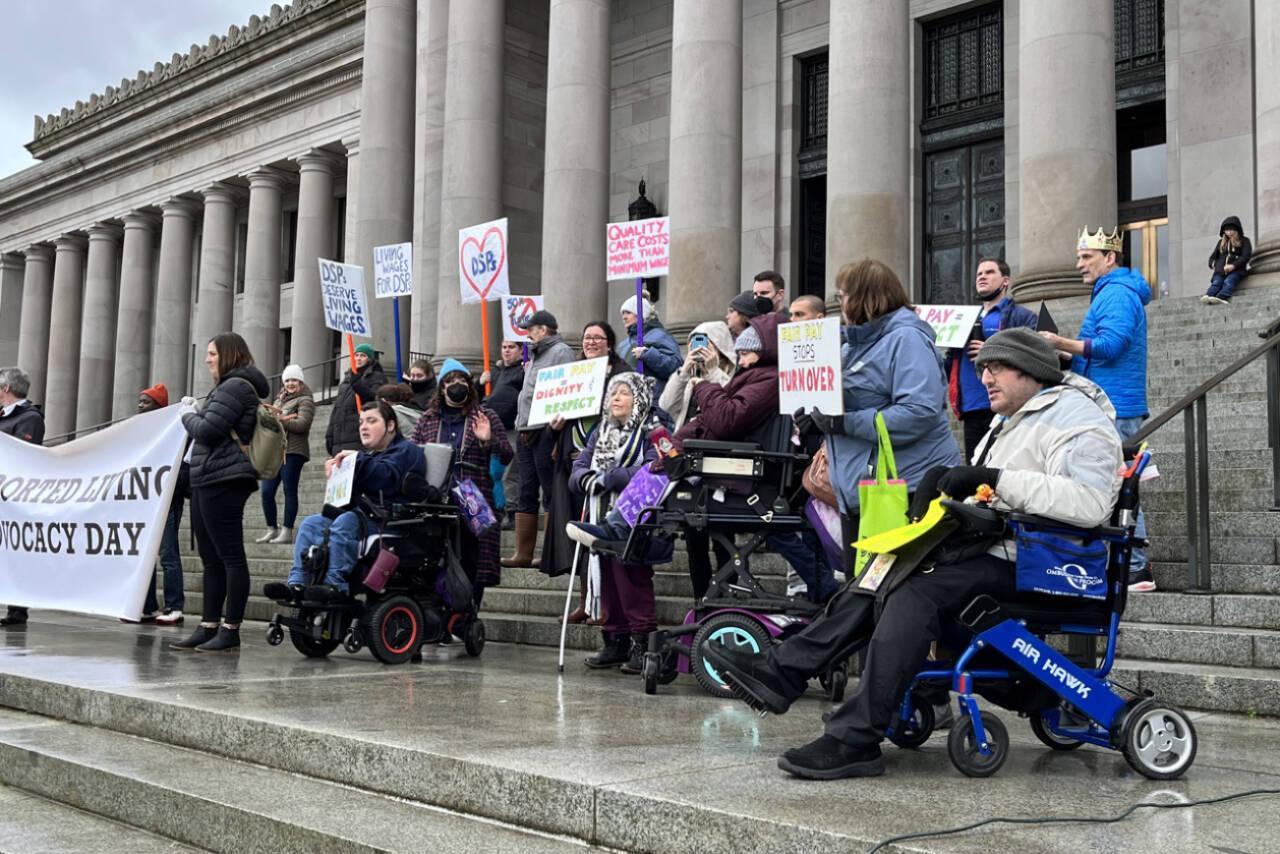By The Herald Editorial Board
Among Washington state’s most vulnerable people are some 4,600 who live with significant intellectual and developmental disabilities, people who are dependent on the care of trained direct support professionals.
Those care workers, who number about 14,000, are almost entirely compensated through Medicaid funding, at a rate determined by Washington state. That’s meant a constant and regular push for funding, especially in budget years, before for the state Legislature. And this budget year may complicate the typical funding ask.
Lawmakers are facing a mandate from incoming Gov. Bob Ferguson, who has instructed state departments and agencies to make across-the-board 6 percent cuts, as the state looks to make up for a projected budget shortfall over the next four years between $10 billion and $15 billion.
“That’s going to make it difficult to get anything that’s desperately needed,” said Randy Hauck, executive director for Community Living, a Yakima-based nonprofit that provides supported living services.
Still, the need is desperate, said Hauck and Scott Livengood, chief executive for Alpha Supported Living, a Bothell-based nonprofit that also provides supported living services for adults in children in Snohomish, King and Spokane counties.
Even as covid can seem a distant memory, the pandemic left its mark on the range of medical and other care providers, including the direct support professionals who historically have struggled to make more than the state’s minimum wage.
Prior to an increase in Medicaid reimbursements approved in 2023, most supported living staff earned wages only about 5 percent above the minimum wage.
At the worst of the pandemic, supported living agencies were seeing turnover as high as 74 percent in a year, said Livengood, during a recent interview with the editorial board. That’s improved, he said, but agencies in the latest survey still lost about 37 percent of their staff over the last year, a rate similar to pre-pandemic numbers, which places Washington among the highest quarter of states for turnover.
“Our fear is, if we go into a legislative session with no increases for the next two years, we’ll see that spike back up,” he said.
Wages remain less than competitive, especially for what is demanding work, as compared to other fields. Inflation and growing need have cut into the last increase in the Medicaid reimbursement rate, resulting in a 10 percent funding gap for wages, one that is expected to increase to 19 percent by 2027 without increases, according to the Community Residential Services Association.
Current wages are 21.5 percent below what’s considered a self-sufficient wage.
Livengood, Hauck and others are seeking an adjustment of the Medicaid adjustment rate, increasing those rates by 4 percent in 2026 and another 4 percent in 2027. In addition, the association is seeking a $50 million investment, through the state’s capital budget, for the state’s housing trust fund, which would build and renovate homes that can be used to house and care for those needed supported services.
There’s an argument to be made that these investments — rather than holding rates at current levels — are a more efficient use of public funds and can save the state money.
With no increase to the reimbursement rate and employee pay, the agencies will continue to lose experienced workers, limiting the services available to those who need them.
Currently, in addition to the 4,600 in supported living homes and facilities, there are more than 200 who live in state-operated facilities and nearly 500 living in residential habilitation centers, both at greater costs to the state. Supported living costs the state about $585 per client, per day, compared to $1,417 per client, per day at the state-operating facilities and $1,614 per client, per day at the residential centers.
Increasing the number of openings at supported-living homes and assuring employee retention could result in savings for the state.
And it’s not that lawmakers don’t understand the math, Hauck said.
“When we talk with legislators, typically, they have a pretty good understanding of what our needs are. It typically comes down to, OK, this sounds great, but where are we going to get the money?” he said.
That question doesn’t refute the need.
“It has to be provided, otherwise fewer people will be served, and individuals who are waiting will wait longer,” Livengood said.
A recently completed pilot project provides further justification for investing in supported living services.
A growing need among those using these services are those with a mental health diagnosis in additional to intellectual and developmental disabilities, Livengood said. A complex needs pilot project took 30 such individuals and provided care at a higher reimbursement rate that allowed better compensation and training for care staff.
“We saw all 30 individuals placed, and we saw lower turnover, about half the turnover level in these projects compared to regular, supported living,” Livengood said.
A report on the pilot program gave a similar assessment: “The complex needs pilot program provides the individual the opportunity to live successfully in the community with the supports they need while avoiding the high cost of residential habitation centers and hospitals. The infrastructure provided the training to staff needed to support individual’s complex needs.”
In balancing the state’s budgets, lawmakers and the governor, as well as taxpayers, should consider — along with budget cuts — the budget investments that save money.
Talk to us
> Give us your news tips.
> Send us a letter to the editor.
> More Herald contact information.


























